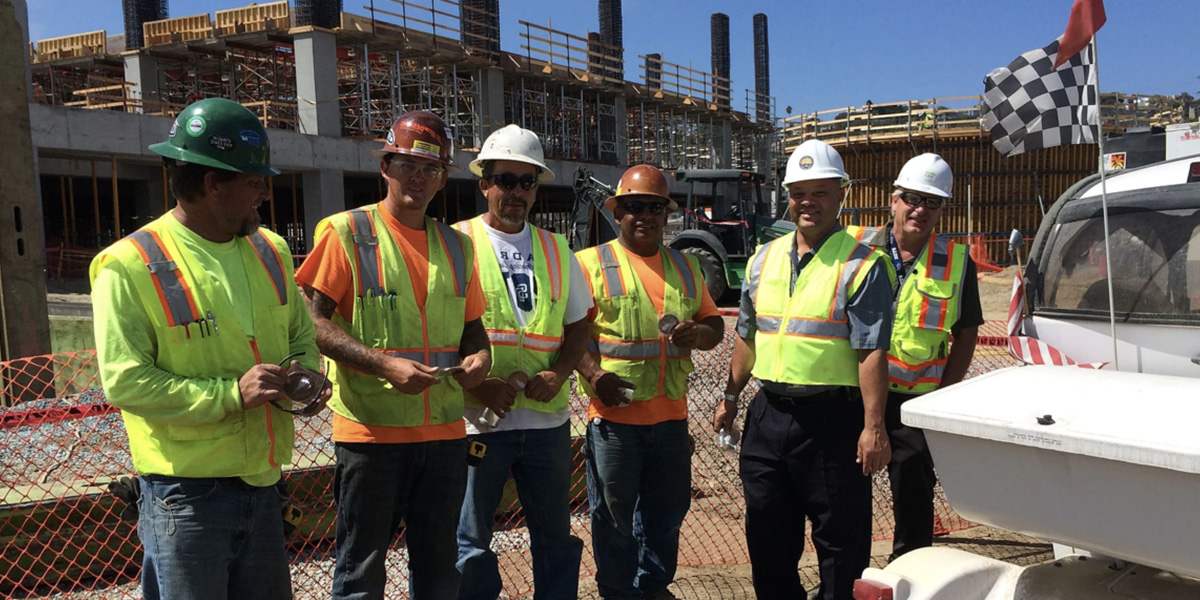

According to a recent survey from the Associated General Contractors of America (AGC) and Autodesk, 80 percent of construction firms say they are having difficulty filling key positions on their construction teams. While the industry itself is growing rapidly as the demand for new infrastructure projects increases, the skilled workforce needed for these projects has dwindled. According to the U.S. Bureau of Labor Statistics, there are currently 300,000 open positions in the construction industry. That number is expected to swell to nearly 750,000 by 2026. The impact of this labor shortage has been significant; half of the firms surveyed believe it is increasing costs and causing project delays.
What caused the shortage?
Several factors contribute to the construction labor shortage. During the recession, skilled workers who were unable to find work joined new industries. Baby boomers are beginning to retire in record numbers and are leaving all industries, including construction. Those entering the labor market today have unrelated degrees and little interest in the construction field. Tech-savvy millennials aren’t flocking to careers in construction as past generations have, which causes issues for firms trying to meet the ever-increasing demand. The lack of diversity and the uncertainty of immigration reform will only make matters worse.
How are companies coping?
Companies are taking proactive steps to mitigate the impacts of the tight construction labor market. Many firms have done a good job creating in-house training and apprenticeship programs. Others collaborate with state and local governments to create programs designed to attract and train new talent for careers in construction.
Improving labor productivity is another way construction companies are handling the shortage. Unlike other industries, construction has seen little improvement in productivity. A study by McKinsey & Co. found that, while many U.S. sectors increased productivity 10 to 15 times since the 1950s, construction has remained stagnant for 80 years—leading companies are working diligently to improve this. Methods like design-build and lean construction, which require high levels of communication and collaboration among key players on a project, have been proven to enhance efficiency and productivity on projects. Technology such as building information modeling (BIM) and project management software are also being used to improve productivity.
Most importantly, construction companies are rethinking how to attract and retain talent in the modern job market. Job seekers today want more than a well-paying job. Here are some of the things they are looking for:
- Inspiring and strong leadership
- Career growth and professional development
- A noble purpose and an opportunity to give back
- The ability to think creatively and solve problems
- Recognition and rewards
- Teamwork and collaboration
At Western Pump, we work diligently to employ the best workers in the construction industry.
Continue reading to see highlights from an interview with Lori Duncan, our Manager of Human Resources. Lori discusses how Western Pump takes a comprehensive approach to attract and retain talent.
Tell us a little about yourself. What is your role at Western Pump?
My name is Lori Duncan, and I am the Human Resource Manager at Western Pump. I hold an SPHR (Senior Professional in Human Resources) certification and a PHRca certification (Professional in Human Resources with an emphasis on the unique California HR environment). I have been working in the Human Resources field for about ten years. I’m pleased to be able to continue to contribute as the company grows. It’s a joy to bring individuals on and see them do good work and become as passionate about their work at Western Pump as I am. It’s really an exciting place to work for me.
Why is it so difficult to find good talent in the construction industry?
The construction industry, in the good economy that we’ve been enjoying, has experienced quite a bit of growth. There is a high demand for skilled and qualified construction talent on all levels. There’s a considerable amount of knowledge required in our industry about the regulatory environment and the petroleum equipment with which we work, meaning our employees require a certain level of certification. Our employees need to love and understand the work that they do while at the same time having time to study and prepare for exams the state requires to work in this industry. Narrow that down enough, aside from the difficulties finding skilled and trained workers faced by the construction industry generally, our specialty has some particularly difficult challenges to overcome. Additionally, young people aren’t entering the field as frequently as in times past. They may be encouraged to go in other directions. They may not be aware of the value-added in the construction industry—the satisfaction that our employees feel of a job well done when the task is completed, and they can say, “I built that.”
How does Western Pump keep its top talent?
Retaining good employees is a function of attention, recognition, and appreciation for the hard work that they do. Acknowledging and rewarding it is very important. At the same time, most employees need opportunities for growth, which can only happen if managers, foremen, and supervisors engage with the employees. It’s important to discuss the next steps. How do we develop this employee? How do we offer them the training they want and need? How do we offer them challenges that keep them engaged without pushing harder than they are willing to go?
Another interesting element about retaining top talent in the construction industry is technology as a tool for employees in the field. There is always a lot of paperwork involved with construction, a lot of required documentation. Mobile technology that helps them do their job more easily and accurately is significant in keeping our employees motivated and engaged. This is especially true for our younger employees.
Essential to retaining our employees are good benefits and a fair wage. This an area where our employees can be tempted to change employers. If we are not competitive with our compensation package for our employees, we will lose them; this is especially true in the tight labor market.
When Dennis Rethmeier bought Western Pump in 1988, he realized early on that what mattered the most were the company’s values. To that end, he wrote the original code of conduct and a “shared values” document that I still hand to employees today. Recently, we revisited this document. Our culture is key not only in terms of business and vendor relationships, but in what it means to be an employee at Western Pump and what we seek to do in our recruitment. I see this document as part of the reason why people want to come and work for us and why our current employees would refer individuals whom they see as a good fit. It is crucial for that constant striving toward who we seek to become and a standard to aim for in all our relationships. Our values define how we build our reputation as an employer and give us a benchmark for asking the question, “Is this the right person to bring on board to Western Pump?”
How does Western Pump find and attract top talent?
An excellent source for new hires is referrals from existing employees. There are things that we know already about our employees—what their values are and how they work together with Western Pump’s values. Our current employees don’t want to refer somebody to us that they don’t find to be a reliable team member with the skill set needed to effectively do the job.
Another initiative that we focused on in 2019 and anticipate continuing to focus on this year is the recruitment of military veterans that have either left the military or will soon. Often, military veterans have desirable, transferable skill sets. There’s also a certain rigor in their ability to study for and pass some of these examinations. In the past year, we have successfully hired two veterans and they have performed excellently.
We are also looking at opportunities to partner with vocational programs and community colleges. We have recently started to engage a little bit networking-wise. We look forward to continuing to explore that. Beyond that, we will be participating in veteran and community college job fairs.
About Western Pump
We are a general and specialty contractor serving the petroleum and transportation industries, as well as mission-critical infrastructure. Western Pump provides a wide range of construction, maintenance, and compliance services to private and public customers. We have completed work for government agencies, private developers, major oil companies, educational organizations, and general contractors.